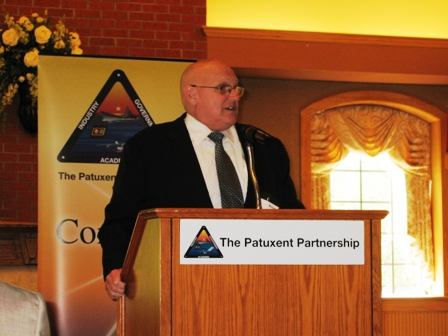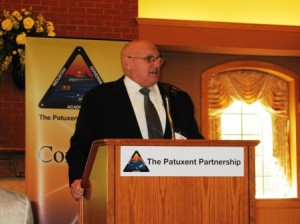Armitage: “Bullish on this Country of Ours”

 “I feel like just another guy who can’t keep a job,” said Ambassador Richard Armitage after Bonnie Green, president of The Patuxent Partnership introduced him with a litany of his many achievements, and yes, his many jobs since graduating from the U.S. Naval Academy in 1967.
“I feel like just another guy who can’t keep a job,” said Ambassador Richard Armitage after Bonnie Green, president of The Patuxent Partnership introduced him with a litany of his many achievements, and yes, his many jobs since graduating from the U.S. Naval Academy in 1967.
Mr. Armitage spoke to an appreciative crowd Wednesday – 200 had signed up to hear him — at the Bay District Fire Hall in Lexington Park, MD. In a 45-minute extemporaneous presentation centered on Asia, followed by Q&A, the former deputy secretary of state provided a detail-packed account of economies, cultures, historical relationships, warfare and reconciliation involving the United States, its allies and its adversaries.
Why is Asia so important? Considering just its population size and GDP, “It’s the center of gravity for the whole world, “Mr. Armitage said. Within Asia, what he terms the “re-rise” of China is the most significant. Plagued by pollution, corruption, and work force asymmetry – Mr. Armitage noted that China has 900 million farmers, but needs only 300 million to feed that nation – China has tremendous challenges to overcome even with its economic success to celebrate. China also has a long-standing territorial dispute with Japan over East China Sea islands, which causes tensions throughout the region.
“Sovereignty is a core value for China,” Mr. Armitage says. “How the Chinese behave on their island issues will tell us what kind of a state China is.”
Internally, Chinese leaders are nervous about the increasing boldness of the Chinese people, he says. “The one thing they really fear is chaos.”
Saber-rattling North Korea’s Kim Jong Un “could turn out to be a real rough customer,” Mr. Armitage says. Every South Korea leader has been tested shortly after winning election, and he expects Madame Park (President Park Geun-hye), elected in December 2012, to be no exception. A possible provocation would be some North Korean act of violence in the Yellow Sea, he says. “Her razor-thin margin of victory in the election will force her to respond,” he says. “She may look like a sweet package but she’s very tough.”
Mr. Armitage offered insights on other nations as well:
Japan: The revolving door in the prime minister’s office has been challenging for diplomacy (“They change prime ministers more often than we change shirts.”) With Prime Minister Shinzo Abe in office once again, Armitage expects “a period of steady sailing.” He also says Mr. Abe “needs to get the Japanese people confident enough to get off their wallets.” The U.S. relationship with Japan is crucial, he emphasized, “as U.S. bases there permit our country to affect security throughout Asia.”
Indonesia: A moderate Islamic country, a democracy, the world’s fourth-most populous country, is on the ascent, says Mr. Armitage. “If they get it right, they will be a force to be reckoned with.”
India: A valued democratic anchor in the region, he says.
Pakistan: “The most dangerous place in the world, but not because of nuclear weapons,” says Mr. Armitage. “The problem is you have 190 million Pakistanis of very young age, with no knowledge, care or benefit from any government they’ve had. They’re ripe for the plucking [by extremists]. The 2 percent growth rate in Pakistan is a death sentence – it won’t feed a rapidly expanding population.”
Afghanistan: “We tried to hold President Hamid Karzai to a standard not known there,” Mr. Armitage said. He predicts that after Karzai, who cannot succeed himself, Afghanistan will have a loose federation of factions and tribes, and a weak central government.
For his part, Mr. Armitage remains a passionate defender of his country. “There’s a cottage industry on the decline of the United States. You can read something about that every day. It gets on my nerves.” As counterpoint to the naysayers, he recalled a conversation with Singapore statesman Lee Kwan Yew, who once told him: “The primacy you put on the individual’s interests makes you the most innovative country in the world. You cannot be beaten.”
“Why are people lined up to get into our country? They’re not lining up to get into China,” he said, grinning. “I’m pretty bullish on this country of ours.”























